Houston Beauty school’s legacy resonates a century later
Nobia Franklin was born in 1892 in Cuero, a rural South Texas community where cotton and turkeys were the main source of income. Early on, she turned to beauty, styling the hair of her friends and neighbors. That grew into a healthy business in one of the few fields outside domestic service open to black women at the time.
More than a century later, the Franklin Beauty School in Houston remains a thriving family enterprise and Madame N.A. Franklin remains a source of inspiration.
“Black women were challenging racism and sexism. They’re not supposed to be entrepreneurs, they’re not supposed to be creating businesses, and they’re certainly not supposed to create businesses that are still open 100 years later,” Sam Houston State University historian Bernadette Pruitt said. “Franklin not only creates this business and is able to create a formula for generational wealth for her descendants, but she’s also indirectly teaching the men in her family the importance of respecting black womanhood.”
Read The Houston Chronicle story here.
Emancipation Means Migration!
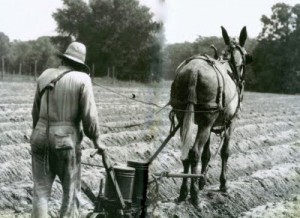 In an exclusive submission for the TIPHC, Starita Smith, Ph.D., writes about the aftermath of the Emancipation Proclamation in Texas and what it meant for newly freed slaves:
In an exclusive submission for the TIPHC, Starita Smith, Ph.D., writes about the aftermath of the Emancipation Proclamation in Texas and what it meant for newly freed slaves:
“The months and years after the Emancipation Proclamation finally made it to Texas on June 19, 1865 (Juneteenth) were full of uncertainty and movement for ex-slaves. After having every part of their lives controlled by their owners, these African Americans had to figure out how they were going to put food on the table, house themselves, and make a better future for their families than the past they had endured. In many cases the end of slavery meant that African Americans could try to reunite their families by looking for sons and daughters, mothers and fathers, husbands and wives, and other loved ones who had been separated from them by sale to different owners in other states. While some traveled in the iconic wagon trains of Western history, most walked from place to place searching for new possibilities.”
Read her essay posted on our “Research Projects” page.
Longtime Dallas Funeral Home Curates African-American History
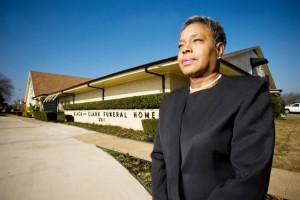 If you want to fully understand the significance of the Black and Clark Funeral Home to North Texas, the story starts with the end of many lives.
If you want to fully understand the significance of the Black and Clark Funeral Home to North Texas, the story starts with the end of many lives.
Inside tattered books are the death certificates of African-Americans who chose to make their free lives in the 19th century south. Each turn of the worn pages takes you further back from the Civil Rights Era to Jim Crow to Reconstruction to Emancipation.
Curating this rich history is the responsibility of current owner Linda Mitchell.
“We need to know our history and I think sometimes we’re so busy living and moving forward that we forget where we come from,” said Mitchell.
For Financially Challenged Black Men, HBCUs Can Be Key
 Opinion, from Dr. Larry J. Walker in Ebony magazine: Black men encounter unique obstacles when it comes to getting an education, experts say, which is why a Black college can make a serious difference.
Opinion, from Dr. Larry J. Walker in Ebony magazine: Black men encounter unique obstacles when it comes to getting an education, experts say, which is why a Black college can make a serious difference.
A recent study of students at HBCUs by Tammy Lane at Prairie View A & M University found that the lack of financial resources (institutional aid and scholarships.) negatively impacted a student’s ability to graduate. Retaining students at HBCUs is inextricably linked to providing as much financial support as possible. However, because of historical inequities—which can sometimes include limited state funding—some Black colleges struggle to provide ample aid, and as a result, the attrition rate rises. It’s a problem that far too many of our colleges have to overcome.
Fortunately HBCUs, including institutions such as Howard University, are finding ways to help Black men like Adams. This year, at HU, more than 100 students received a rebate for graduating in four years. Howard’s progressive plan could provide a template for other HBCUs. Finding ways to help Black men stay on the college path is important, and a college graduate rebate program is a nice way to get some extra cash in the pocket on the way out the door.
Read more here.
Dr. Larry J. Walker is a consultant and former Capitol Hill staffer. He is the co-editor of “Graduate Education at Historically Black Colleges and Universities: A Student Perspective.”
TIPHC Bookshelf
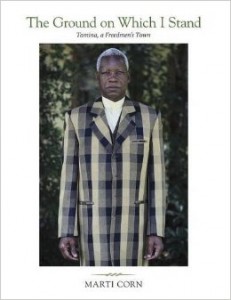 Published scholarship on black history in Texas is growing and we’d like to share with you some suggested readings, both current and past, from some of the preeminent history scholars in Texas and beyond. We invite you to take a look at our bookshelf page — including a featured selection — and check back as the list grows. A different selection will be featured each week. We welcome suggestions and reviews. This week, we offer, “The Ground on Which I Stand, Tamina, a Freedmen’s Town,” by Marti Corn.
Published scholarship on black history in Texas is growing and we’d like to share with you some suggested readings, both current and past, from some of the preeminent history scholars in Texas and beyond. We invite you to take a look at our bookshelf page — including a featured selection — and check back as the list grows. A different selection will be featured each week. We welcome suggestions and reviews. This week, we offer, “The Ground on Which I Stand, Tamina, a Freedmen’s Town,” by Marti Corn.
In 1871, newly freed slaves established the community of Tamina—then called “Tammany”—north of Houston, near the rich timber lands of Montgomery County. Located in proximity to the just-completed railroad from Conroe to Houston, the community benefited from the burgeoning local lumber industry and available transportation. The residents built homes, churches, a one-room school, and a general store.
Through striking and intimate photography and sensitively gleaned oral histories, Marti Corn has chronicled the lives, dreams, and spirit of the people of Tamina. The result is a multi-faceted portrait of community, kinship, values, and shared history.
This Week In Texas Black History, June 19-25
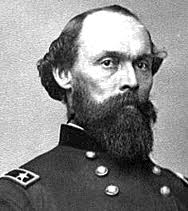 19 – On this day in 1865, Union General Gordon Granger arrived in Galveston and delivered the news about the Emancipation Proclamation, which had originally been issued by President Abraham Lincoln in 1863. Granger, supposedly from a balcony at Ashton Villa, one of the state’s first brick structures, read General Order No. 3, which officially freed 250,000 slaves in Texas. The order read: “The people are informed that in accordance with a Proclamation from the Executive of the United States, all slaves are free. This involves an absolute equality of personal rights and rights of property, between former masters and slaves, and the connection heretofore existing between them, become that between employer and hired labor. The freed are advised to remain at their present homes, and work for wages. They are informed that they will not be allowed to collect at military posts; and that they will not be supported in idleness either there or elsewhere.” In 1979 Governor William P. Clements signed an act making the day a state holiday. The first state-sponsored Juneteenth celebration took place the next year.
19 – On this day in 1865, Union General Gordon Granger arrived in Galveston and delivered the news about the Emancipation Proclamation, which had originally been issued by President Abraham Lincoln in 1863. Granger, supposedly from a balcony at Ashton Villa, one of the state’s first brick structures, read General Order No. 3, which officially freed 250,000 slaves in Texas. The order read: “The people are informed that in accordance with a Proclamation from the Executive of the United States, all slaves are free. This involves an absolute equality of personal rights and rights of property, between former masters and slaves, and the connection heretofore existing between them, become that between employer and hired labor. The freed are advised to remain at their present homes, and work for wages. They are informed that they will not be allowed to collect at military posts; and that they will not be supported in idleness either there or elsewhere.” In 1979 Governor William P. Clements signed an act making the day a state holiday. The first state-sponsored Juneteenth celebration took place the next year.
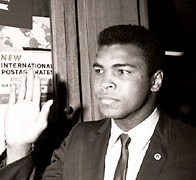 20 – On this day in 1967, a jury in federal court in Houston found heavyweight champion Muhammad Ali guilty of draft evasion. Ali, who had a residence in Houston at the time, was known to the government as Cassius Clay and was sentenced to five years in prison and a $10,000 fine. Ali’s contention was that the draft boards in Louisville, Ky., his hometown, and in Houston had acted improperly by not granting him a deferment as a minister in the Nation of Islam, however, he was convicted of violating the U.S. Selective Service laws by refusing to be drafted. He had been ordered to report to a Houston induction station on April 28, 1967 and did, but refused to step forward when his named was called, afterwards saying, ”Man, I ain’t got no quarrel with them Vietcong.” He was immediately stripped of his boxing license and his title and was banned from boxing for three years. He stayed out of prison as his case was appealed. The case reached the U.S. Supreme Court, and on June 28, 1971 (Clay, aka Ali, v. United States) the Court ruled 8-0, with Justice Thurgood Marshall abstaining, that Ali met the three standards for conscientious objector status: that he opposed war in any form, that his beliefs were based on religious teaching and that his objection was sincere. However, Ali had already resumed boxing on October 26, 1970, knocking out Jerry Quarry in Atlanta in the third round.
20 – On this day in 1967, a jury in federal court in Houston found heavyweight champion Muhammad Ali guilty of draft evasion. Ali, who had a residence in Houston at the time, was known to the government as Cassius Clay and was sentenced to five years in prison and a $10,000 fine. Ali’s contention was that the draft boards in Louisville, Ky., his hometown, and in Houston had acted improperly by not granting him a deferment as a minister in the Nation of Islam, however, he was convicted of violating the U.S. Selective Service laws by refusing to be drafted. He had been ordered to report to a Houston induction station on April 28, 1967 and did, but refused to step forward when his named was called, afterwards saying, ”Man, I ain’t got no quarrel with them Vietcong.” He was immediately stripped of his boxing license and his title and was banned from boxing for three years. He stayed out of prison as his case was appealed. The case reached the U.S. Supreme Court, and on June 28, 1971 (Clay, aka Ali, v. United States) the Court ruled 8-0, with Justice Thurgood Marshall abstaining, that Ali met the three standards for conscientious objector status: that he opposed war in any form, that his beliefs were based on religious teaching and that his objection was sincere. However, Ali had already resumed boxing on October 26, 1970, knocking out Jerry Quarry in Atlanta in the third round.
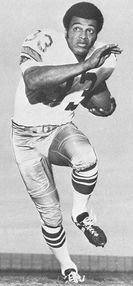 21 – Dallas Cowboys’ running back Duane Thomas was born on this day in 1947 in Dallas. Thomas had an exceptional career at Lincoln High School, then at West Texas State, where he teamed with another future pro running back, Mercury Morris. Thomas was the Cowboys’ first round pick (23rd overall) in the 1970 draft and was the NFC Rookie of the Year after leading Dallas in rushing (803 yards). He led the league in rushing in 1971 and led the Cowboys with 95 rushing yards and a touchdown in Dallas’ first Super Bowl victory, a 24-3 win over the Miami Dolphins in Super Bowl VI.
21 – Dallas Cowboys’ running back Duane Thomas was born on this day in 1947 in Dallas. Thomas had an exceptional career at Lincoln High School, then at West Texas State, where he teamed with another future pro running back, Mercury Morris. Thomas was the Cowboys’ first round pick (23rd overall) in the 1970 draft and was the NFC Rookie of the Year after leading Dallas in rushing (803 yards). He led the league in rushing in 1971 and led the Cowboys with 95 rushing yards and a touchdown in Dallas’ first Super Bowl victory, a 24-3 win over the Miami Dolphins in Super Bowl VI.
 21 – On this date in 1955, the El Paso School Board voted to abolish segregation in the city’s public schools becoming the first district in Texas to unconditionally favor desegregation. The move came one year after the U.S. Supreme Court struck down segregation in public schools in the Brown v. Board of Education decision. El Paso board member Ted Andress made the motion: “The School Board members have taken notice of the recent Supreme Court decision on compulsory segregation (which was enforced in Texas). I think it is time that this board makes the prompt and reasonable start toward integration that should be made. I move that we comply with all rulings of the Supreme Court and that segregation on a compulsory or involuntary basis shall not be enforced in the El Paso Public Schools.” The motion took effect with the opening of schools for the 1955 fall semester.
21 – On this date in 1955, the El Paso School Board voted to abolish segregation in the city’s public schools becoming the first district in Texas to unconditionally favor desegregation. The move came one year after the U.S. Supreme Court struck down segregation in public schools in the Brown v. Board of Education decision. El Paso board member Ted Andress made the motion: “The School Board members have taken notice of the recent Supreme Court decision on compulsory segregation (which was enforced in Texas). I think it is time that this board makes the prompt and reasonable start toward integration that should be made. I move that we comply with all rulings of the Supreme Court and that segregation on a compulsory or involuntary basis shall not be enforced in the El Paso Public Schools.” The motion took effect with the opening of schools for the 1955 fall semester.
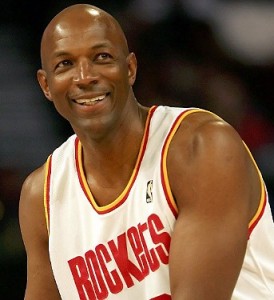 22 – On this date in 1962, basketball great Clyde “The Glide” Drexler was born in New Orleans. Drexler graduated from Sterling High School in Houston then attended the University of Houston where he starred as a member of the teams known as Phi Slama Jama for their fast pace, dunking, high flying style. Drexler was the 14th overall pick of the 1983 NBA Draft by the Portland Trail Blazers and twice led the team to the NBA Finals (1990, 1992). However, he played alongside center and former UH teammate Hakeem Olajuwon on the Houston Rockets 1995 NBA title team. Drexler was a 10-time All-Star, a member of the 1992 U.S. Olympic dream team, and named one of the 50 greatest players in NBA history. He was elected to Naismith Memorial Basketball Hall of Fame in 2004.
22 – On this date in 1962, basketball great Clyde “The Glide” Drexler was born in New Orleans. Drexler graduated from Sterling High School in Houston then attended the University of Houston where he starred as a member of the teams known as Phi Slama Jama for their fast pace, dunking, high flying style. Drexler was the 14th overall pick of the 1983 NBA Draft by the Portland Trail Blazers and twice led the team to the NBA Finals (1990, 1992). However, he played alongside center and former UH teammate Hakeem Olajuwon on the Houston Rockets 1995 NBA title team. Drexler was a 10-time All-Star, a member of the 1992 U.S. Olympic dream team, and named one of the 50 greatest players in NBA history. He was elected to Naismith Memorial Basketball Hall of Fame in 2004.
Blog: Ron Goodwin, author, PVAMU history professor
Ron Good 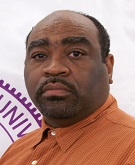 win’s bi-weekly blog appears exclusively for TIPHC/TBHPP. Goodwin is a San Antonio native and Air Force veteran. Generally, his column will address contemporary issues in the black community and how they relate to black history. He and the TIPHC/TBHPP staff welcome your comments. His latest blog is, “The “Roots” of the problem.” Read it
win’s bi-weekly blog appears exclusively for TIPHC/TBHPP. Goodwin is a San Antonio native and Air Force veteran. Generally, his column will address contemporary issues in the black community and how they relate to black history. He and the TIPHC/TBHPP staff welcome your comments. His latest blog is, “The “Roots” of the problem.” Read it
Submissions Wanted
Historians, scholars, students, lend us your…writings. Help us produce the most comprehensive documentation ever undertaken for the African American experience in Texas. We encourage you to contribute items about people, places, events, issues, politics/legislation, sports, entertainment, religion, etc., as general entries or essays. Our documentation is wide-ranging and diverse, and you may research and write about the subject of your interest or, to start, please consult our list of suggested biographical entries and see submission guidelines. However, all topics must be approved by TIPHC/TBHPP editors before beginning your research/writing.
We welcome your questions or comments via email or telephone – mdhurd@pvamu.edu.
